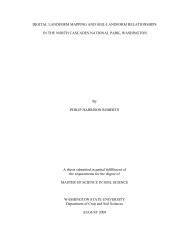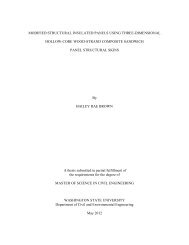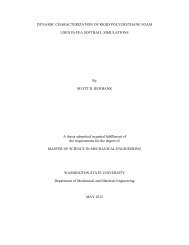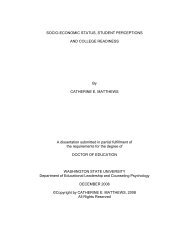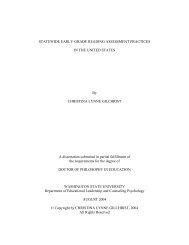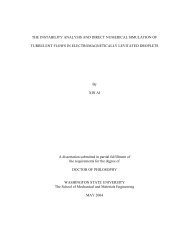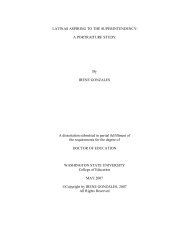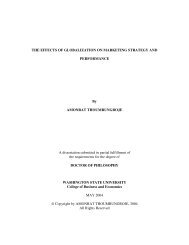the moral reasoning of student athletes and athletic training students
the moral reasoning of student athletes and athletic training students
the moral reasoning of student athletes and athletic training students
Create successful ePaper yourself
Turn your PDF publications into a flip-book with our unique Google optimized e-Paper software.
CHAPTER ONE<br />
Introduction<br />
What is it about sport that is so appealing to citizens all over <strong>the</strong> world? Is it <strong>the</strong><br />
opportunity to engage in an entertaining form <strong>of</strong> social interaction or <strong>the</strong> desire to participate <strong>and</strong><br />
belong to a sporting community? Is it a desire to escape from <strong>the</strong> every day life to which we have<br />
become accustomed, or is it something deeper? Perhaps, in addition to all <strong>the</strong>se things, <strong>the</strong>re is<br />
something inherently great about sport that continues to motivate <strong>and</strong> inspire people all over <strong>the</strong><br />
world. Sport seems to be rooted in a determination <strong>and</strong> drive for excellence satisfied only by<br />
victory <strong>and</strong> accomplishment. The astonishing grace with which elite <strong>athletes</strong> defy natural laws<br />
<strong>and</strong> continually surpass <strong>the</strong> performances <strong>of</strong> <strong>the</strong>ir predecessors is an art. The intensity <strong>of</strong><br />
competition is not only entertaining, it’s addictive.<br />
Over 2000 years ago, ancient Greek Olympians competed under <strong>the</strong> motto Citius, Altius,<br />
Fortius which translates to swifter, higher <strong>and</strong> stronger (Eichner, 1997). The competitions were<br />
held to determine <strong>the</strong> best <strong>athletes</strong> in <strong>the</strong> world. “Victory goes to <strong>the</strong> <strong>athletes</strong> with <strong>the</strong> best<br />
combination <strong>of</strong> natural ability, stamina, courage, willingness to undergo intense <strong>and</strong> difficult<br />
<strong>training</strong>, <strong>and</strong> strategic cunning” (Catlin & Murray, 1996, p. 237). Giamatti, former president <strong>of</strong><br />
Yale <strong>and</strong> commissioner <strong>of</strong> baseball, argued that <strong>the</strong> beauty <strong>of</strong> competition lies in <strong>the</strong> ideal:<br />
To toughen <strong>the</strong> body <strong>and</strong> temper <strong>the</strong> soul…<br />
To emphasize integrity <strong>and</strong> develop courage…<br />
To be obedient to <strong>the</strong> letter <strong>and</strong> spirit <strong>of</strong> <strong>the</strong> rules…<br />
So winning is sweeter still (Simon, 1985).<br />
And as Simon (1985) would argue, “Competition is a mutual quest for excellence through<br />
challenge.” In o<strong>the</strong>r words, ra<strong>the</strong>r than seeing rules <strong>and</strong> opponents as objects to overcome,<br />
1



